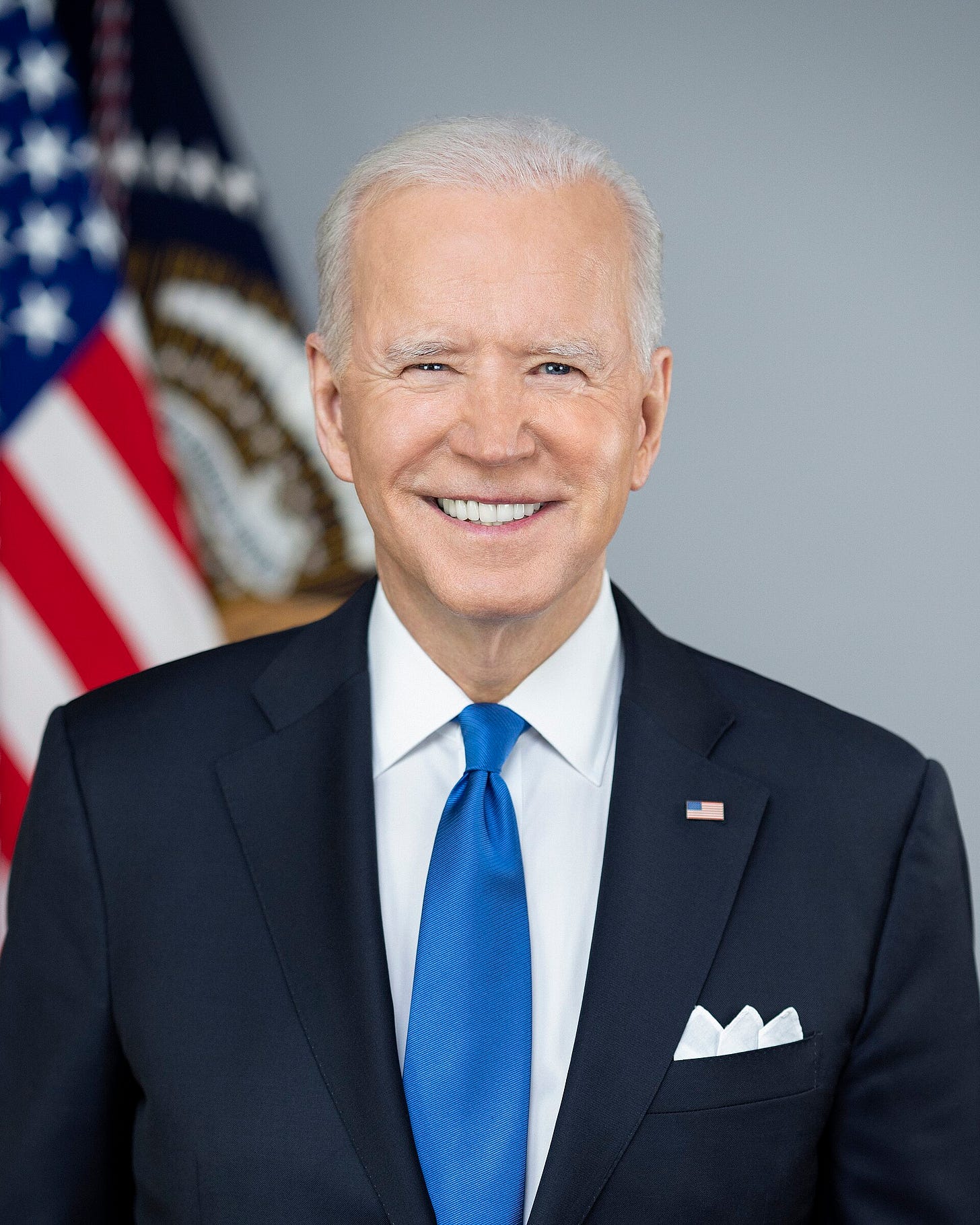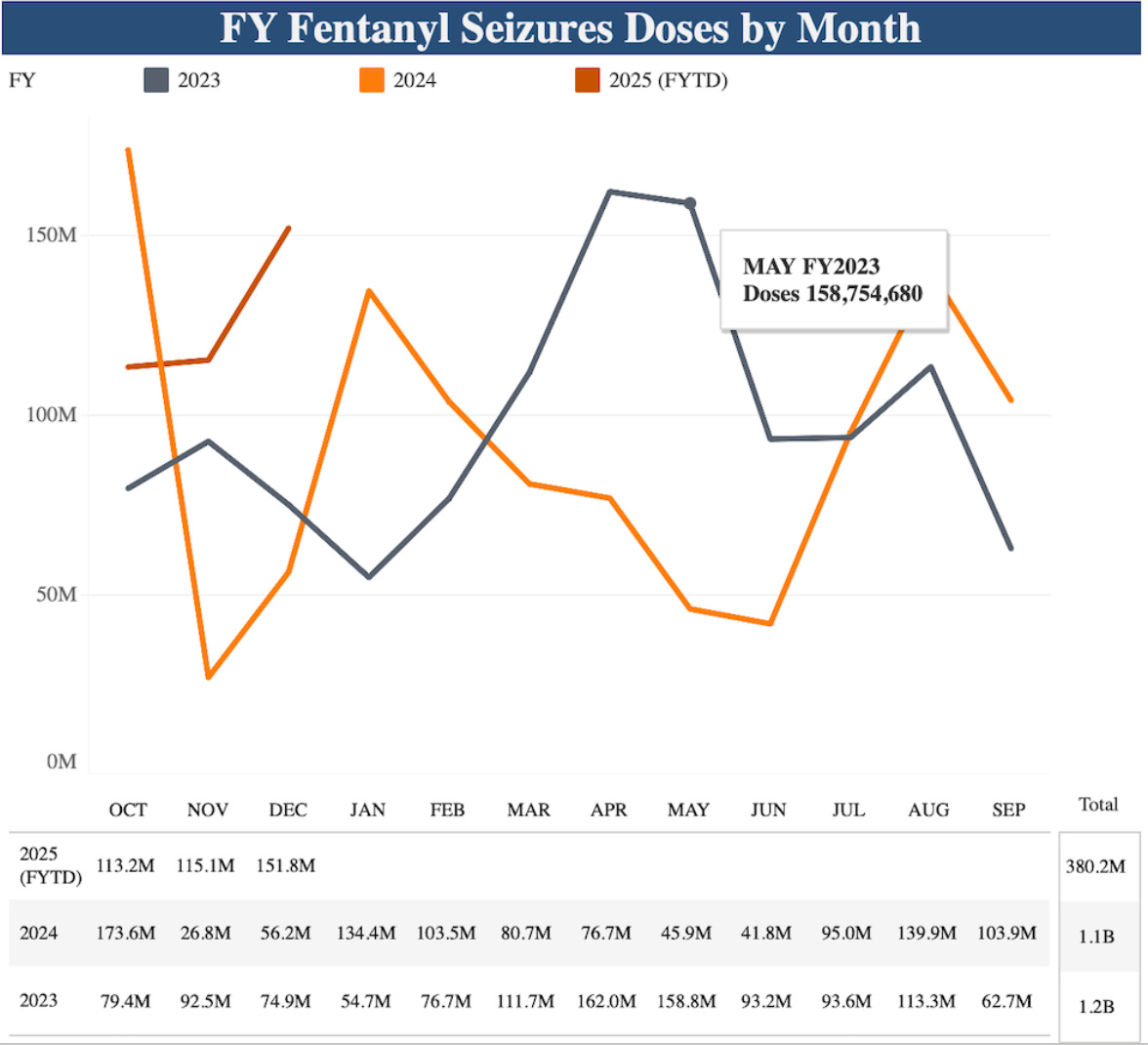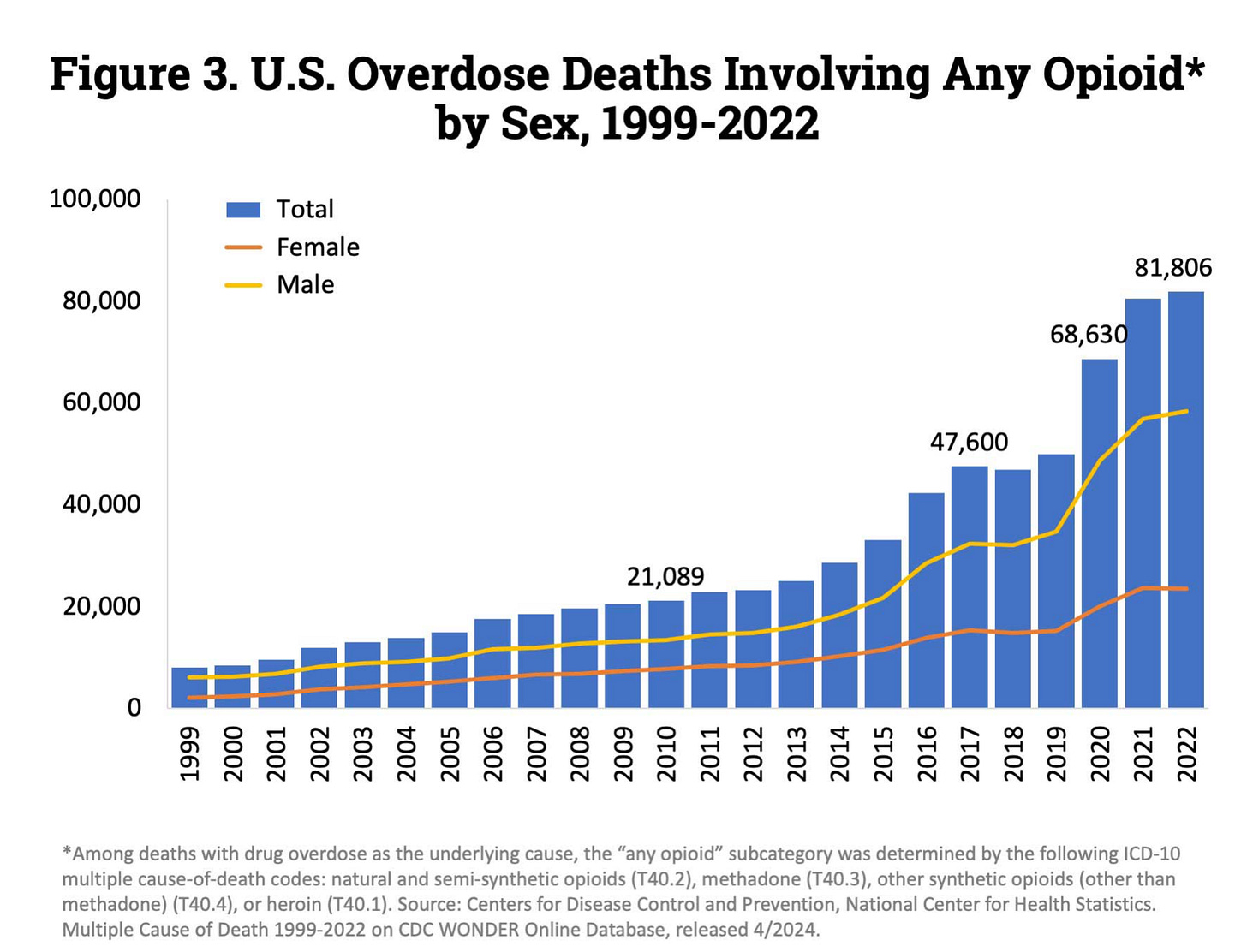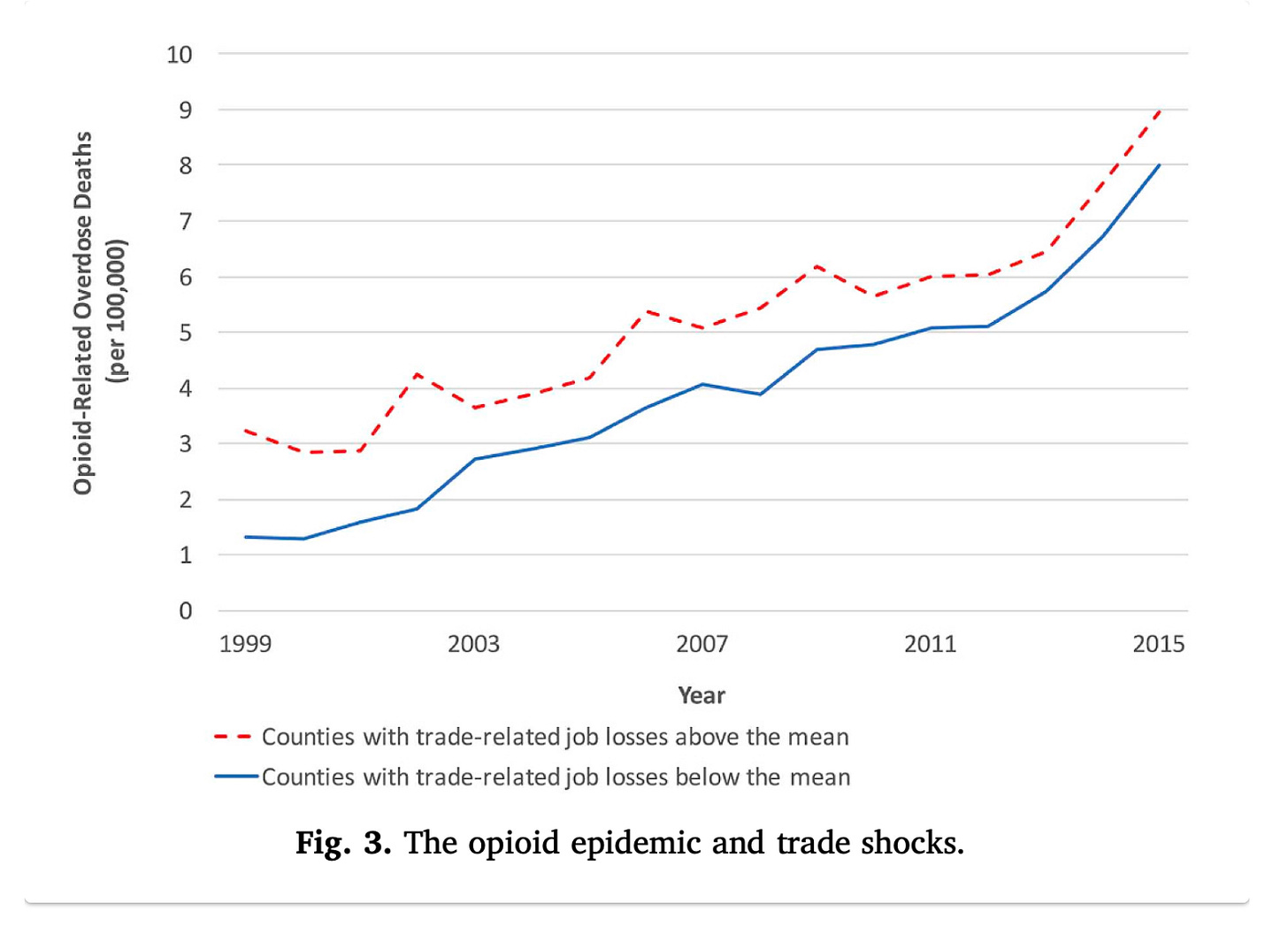Is Trump's Negotiation Style Effective?
Trump's concern around fentanyl has merit, but his aggressive compellence strategy carries risks and long-term costs for the US
About five to seven grains of salt.
That is the approximate amount of fentanyl needed to produce a deadly overdose.
Unlike salt, fentanyl cannot be smelled or tasted, making detection without a kit nearly impossible. The potency of the synthetic opioid has made it a favorite of drug dealers and gangs, who can mix it with other drugs to increase their potency. Because it is so powerful, even a small amount can have a high value to dealers who use it to cut other drugs. Of course, just as it is easy to add a little too much salt to a dish, it is very easy for dealers to accidentally add too much fentanyl, killing their customers.
These deaths have been so substantial that they, incredibly, now account for the most common cause of death for Americans aged 18-45. Many, though certainly not all, of these deaths are concentrated in areas that align with portions of Trump's political base.
In addition to concerns over illegal immigration, these deaths are one stated reason for Trump's threatened trade wars with Canada, Mexico and China. This article looks at the scale of the fentanyl epidemic, as well as looking at what the literature says about Trump's unique 'compellence' negotiation style. What sets Trump apart from past US Presidents is his willingness to use overt and public coercion against US allies. Is this likely to be effective? Is it a smart political strategy? And what do the threatened 25% tariffs against Canada and Mexico, in addition to 10% against China, say about US alliances in the age of Trump? Let's dive in:
Fentanyl is a real problem, and Trump is playing to his base
America's most famous rural area might be Appalachia. It is the region that John Denver's anthem "Country Roads, Take Me Home" was written about, and it is not uncommon for people to romanticize the perceived peace and simplicity of living in the woods--particularly as artists as diverse as Beyonce to Post Malone go country. Yet beyond these romanticized depictions of country life, it is difficult for people not exposed to rural America to understand the vast level of economic and social decay which has occurred in the previous few decades.
Trump has strong support in Appalachia, a generally poor region of America, which I grew up just outside of. Appalachia was hit extremely hard by the offshoring of manufacturing, and has enormous educational problems. A study from 2005 apparently notes that 30% of the population was functionally illiterate.1
But while offshoring hit many nations, the US--and regions like Appalachia--were uniquely damaged by globalization.
Gaglardi et al., (2023) note that early 2000's offshoring of manufacturing—sometimes called the China Shock—hit the United States harder than other advanced democracies. However, areas with high education actually benefitted from the shift, while areas with poor education--like Appalachia--were left rudderless. This fact is part of what led to the rise of JD Vance, who wrote about this in his autobiography 'Hillbilly Elegy.'
But while globalization decimated some of the country, highly educated areas came out on top. Gaglardi et. al notes: "We estimate that a one standard deviation increase in local college share results in a rate of employment growth per decade that is 9.1 percentage points higher..." before continuing to note that this "more than offsets the loss of manufacturing jobs"
This CDC chart shows just how dramatic and shocking the fentanyl epidemic has been for Americans. A drug which was a rounding error for deaths two decades ago now accounts for a majority of deaths, substantially pushing up mortality rates.
Appalachia, as we have seen, is not a highly educated area. And so perhaps it is no surprise that as Appalachia has lost jobs, it also has the highest per capita rate of opioid deaths of anywhere in America. Rigg et al., 2018 It is important to note that the underlying causes of opioid deaths and the political affiliation of voters from those areas are complex. But Trump is a master of understanding and distilling a complex issue into a simple narrative. Thus, it is no surprise that in the 2016 election, Trump and Republicans outperformed in areas stricken by opioids (Goodwin et al. 2018), demonstrating the resonance of his message in communities undergoing severe pain.
From a political perspective, these deaths also fit neatly into Trump's narrative of economic decline. Taking only a 40,000-foot view, it appears that opioid deaths are correlated with job losses and deindustrialization. While the structural causes of the opioid epidemic are debated, involve healthcare shortcomings, and are unlikely to be entirely linked to trade, it is certainly the case that from a political perspective, this is an issue which 1) disproportionately affects Trump's base, and, 2) really is killing people, and 3) just happens to have spiked as jobs were lost from deindustrialization.
Of overdoses, most of them are from opioids, as we can see from this chart which looks very similar to the overall deaths from drug overdose chart we saw earlier.
Regardless of the ultimate structural cause of these deaths, their reality is a powerful and potent political message which is harming entire communities.
Dean and Kimmel (2019) note that "job loss due to international trade is positively associated with opioid overdose mortality at the county-level." These figures are significantly higher in counties with fentanyl use. The paper finds that for each 1,000 job losses, a 2.3 increase in county-level opioid deaths are found. But when fentanyl is in the local supply, an 11.3 percent increase in opioid-related overdose deaths are present.
Trump's concerns about fentanyl are real, well-founded, and fit into his narrative about the hollowing out of American jobs by international trade. Whether his policies actually reduce fentanyl flow or not, he is visibly keeping promises to his base-which includes communities hardest hit by the fentanyl epidemic, making this, in some ways, a smart political move to shore up internal Republican support.
Trump's aggressive style and Putnam's two-level game
Robert Putnam describes international negotiations as a 'two-level game' where both international and domestic political concerns take place. While this is speculation, it seems to me that Trump's actions towards Canada and Mexico are primarily a two level game designed to shore up support among Republicans and deliver what appears to be a political win to his base.
It seems to me that the best way to understand these actions is that:
1) Trump’s strategy reflects his belief in the efficacy of tariffs and a raw power approach that minimizes concern over long-term reputational costs. By employing aggressive compellence (which we will soon analyze), he signals strength to both domestic and international audiences—even if the short-term gains may come at the expense of lasting alliances. He may even see his 'wins' against smaller nations as enhancing his own power further, making him less likely to stop. In this 1984 interview, at around 39:00, Trump claims the US needs other countries to respect it. Given his tariff actions, it appears he desires a certain kind of respect.2
2) Trump is playing what Robert Putnam, in Putnam (1988) calls a two level game where the international threats of tariffs are largely, or at least partially, intended for a domestic audience, including Republican Party cohesion. (If he can even bully the nation of Canada, will a House Republican in a swing district defy him?)
Stepping back a bit, what is compellence and what does the literature say regarding whether these strategies are likely to be effective?
What is compellence?
Compellence is a type of coercion designed to force (or compel) an actor to do something. It differs from deterrence, which involves convincing someone *not to do* something. Coined by Thomas Schelling in 1966, it has been applied to both military and economic issues, and different academics have competing interpretations or definitions of compellence, which we may get into in a future post. But for now, we can think of it in a simple form: Trump is using threats to try to get something he wants.
This is a high risk strategy, but one where the risks were asymmetric. Canada had more to lose than the United States, but both sides would have faced severe economic difficulty, particularly in the automotive sectors, which features tightly linked supply chains between the US carmakers and their factories or suppliers in Canada. (Ironically, Japanese and European car makers with US factories have largely located these factories in the American South, and have less Canadian exposure than US automakers like Ford and GM, which are based in Detroit just across the border from Canada.)
At their worst, tariffs might be an imaginary solution to a real problem.
As Trump wished, it spurred a climbdown from the brink, as similar tactics did in a 2019 spat with Mexico. As a result, Canada and Mexico backed down, but notably did so by making relatively few concessions. For better or worse (likely better) it is difficult to compare this episode to other times in US history because it is extremely rare for a US leader to threaten such large tariffs, against allies, with almost no notice. China, meanwhile looks poised to attempt to absorb its 10% tariff.
Is compellence a good strategy?
The good news for Trump is that compellence can work, but the bad news for America is that it can have major long-term costs
While compellence may secure short-term political wins, its repeated use against long-standing allies risks creating enduring fractures in international relationships. These costs are hard to measure, but in the long-term may outweigh any immediate benefits. Often, however, it is less effective than its practitioners believe it will be. Crucially, for the United State's relationship with Canada and Mexico, it is not a strategy that one generally uses with friends. In fact, most of the compellence literature deals with its use against enemies, making historical comparison difficult. But even those comparisons note that this strategy can backfire and the fact that a nation has more power does not necessarily mean it will prevail in the end.
Patrick Bratton, writing in When is Coercion Successful? notes that deterrence is more likely to be successful than compellence, since deterrence allows an actor to do nothing and claim it is their own choice, while compellence involves an actor changing an action. Canadian and Mexican leaders are also subject to domestic political considerations, and cannot be humiliated too many times before their ability to make deals breaks.

Past episodes of trade wars with allies have unclear lessons, but demonstrate the US does not always win them. The 1980s auto crisis with Japan led to export controls from Japan to the US, but this eventually resulted in the opening of Japanese-owned factories in the US, which now create American jobs but also compete with American companies. George W. Bush eventually dropped his steel tariffs in the early 2000s after being taken to the WTO.
Compellence is not new. An interesting paper by Richard Ned Lebow looks at Thucydides' descriptions of compellence and deterrence in the Peloponnesian War, and argues that, "With one partial exception, all attempts at these strategies fail and generally help to provoke the behavior they were meant to prevent. The narrative and speeches nevertheless indicate that leaders everywhere rely on deterrence and compellence and expect them to succeed."
Ultimately, it's important to remember the limits of power, visibly demonstrated by the US withdrawal from Afghanistan, the collapse of the South Vietnamese government, and the continued success of North Korea's nuclear program. Economic compellence appears to be less studied but it is worth noting that the world economy adapted to Trump’s first-term tariffs against China, later expanded by Biden, suggesting that these tariffs were only partially successful. Indeed economists have noted that, in addition to moving production to other nations like Vietnam, China can weaken its currency to partially offset the impact of tariffs.
Emotions matter, but they're hard to measure
Beyond economics and policy, the tone and language used in these disputes can have profound effects on public perceptions and international diplomacy. During the height of the tariff drama, there were hundreds of reddit posts of angry Canadians claiming they were going to boycott American products, or cancel vacations in the US. While a loss in tourism can be measured, a loss in goodwill is harder to measure. Regrettably, these effects are likely to be long-term, while a Presidential term is only four years.

Needless to say, the related rhetoric that Canada is merely a US state is highly damaging and humiliating in a way which is totally unnecessary and against US interests. Domestic political concerns in Canada and Mexico will likely play a key role going forward, and may backfire on the US. Canada is currently undergoing a leadership struggle for Trudeau's replacement, and will soon face an election with the Conservatives in pole position to win. However, some commentators think the tariff threat is a gift in disguise to Trudeau's party. By coming out against Canada so forcefully, it is probable that the next administration will be less cooperative with the US than if a quiet deal had been negotiated.
These long term narratives really matter. One study found that Israeli and Palestinian youth internalized broader cultural narratives into their own life stories, which of course is one reason that conflict is so intractable. (Hammack, 2008) This deeply personal level of internalizing a national struggle, of course makes compromise more difficult.
The core trade-offs
Every policy in life has trade offs, and this policy seems to sacrifice long-term goodwill and cooperation for short-term political wins. Business certainty and predictability—as well as a reservoir of goodwill—has been traded for an aggressive, public, political win. Was it worth it? It seems hard to believe that Canada, especially, would not have acquiesced to more border security without such a public spat.
While power dynamics matter, short an invasion, the United States simply cannot force other nations to change every policy it dislikes. As a result, cooperation in some future crisis may be reduced, in ways we cannot comprehend, for short-term political gain. At the same time, real cooperation between nations to stop fentanyl flows is needed more than ever before. While threats can compel action, so too can cooperation and genuine ties.
Furthermore, the uncertainty that even the prospect of swingeing tariffs creates is very bad for business. Why should an American or Canadian small business diversify their supply chain—enabling them to further grow their business—if tariffs may make their operations unprofitable?
World leaders also face a dilemma, having to appear tough at home while also protecting their interests. Of British Prime Minister Keir Starmer, Trump recently said “He’s liberal, which is a bit different from me, but I think he’s a very good person and I think he’s done a very good job thus far,” Of course, we have seen how quickly Trump’s opinions of others can change.
The proposed tariffs didn't seem to make sense—but maybe that was the point
Trump's order against Canada seemingly would have slapped a 25% tariff on items *each time* they crossed the border, making car manufacturing using the Canadian/US integrated supply chains, which see partially constructed vehicles and parts cross the border multiple times, financially impossible. Likewise, the immediate tariffs on what are currently untaxed *de minimis* shipments from China, (which are not currently taxed because they have a declared value of under $800) had to be delayed because it was too difficult to immediately implement. These orders seem to be about shock value as much as they are about efficacy.
An alternative set of agreements that did not put public pressure on Canada and Mexico likely was possible. Indeed we are so early into Trump's term that, had private negotiations failed, he could have announced these swingeing public tariffs at a later date. But that would not have provided the political shock value that these moves had.
It remains to be seen whether the 10,000 troops will work, will not be bribed, and will actually be effective. A classic economics fact is that continued demand from Americans (who are among the world's biggest users of drugs) with reduced supply will only increase the prices of drugs. This will, in turn, create opportunities for freelancers to make money off the drug trade, regardless whether they are in government or not.
Parting thoughts:
While Trump’s use of compellence may yield short-term political victories and resonate with key voter groups, the long-term risks—ranging from potential trade disruptions to erosion of diplomatic goodwill—raise important questions about whether these tactics are sustainable. Should these border actions genuinely reduce the deaths of Americans to fentanyl, they may be seen as a success which came at a high diplomatic cost. Given the multifaceted nature of addiction, and the ability of drug markets to adapt to governmental pressure, this seems unlikely at first glance. Moreover, other actions which are likely to help communities dealing with addiction--like subsidized healthcare or anti-addiction services--are likely to be on the chopping block in this administration.
And there is a real risk that future foreign leaders are unable to make compromises for domestic political reasons, making a damaging trade war move from hypothetical to reality. A more measured strategy might secure similar benefits without incurring such high costs and political drama.
Of course, to a leader whose strategy involves drama and force, this might be by design.
For more on tariffs, consider checking out this great Noah Smith piece “Trump Starts to Break Things”.
This is The Studies Show, and I’m Alexander Webb. Since February 2023 we’ve been producing content, and I hope you’ll subscribe if you like what you read. Next up, we are doing a post on the British Empire.
Thanks! Alex
Some of our previous posts include:
We have also been on YouTube and Instagram since early 2023 (@thestudiesshow on both platforms).
I could not download the paper—Shaw, Thomas; DeYoun, Allan; Redemacher, Eric. (2005)—but instead was able to read a portion of another paper which cited this one.
Interestingly, at 43:30 or so, at 34-year-old Trump says that he worries he could not get elected President because he holds unpopular views which are nonetheless correct, but would lose to someone with a “big smile.”








Phenomenal post. This is the first I've heard of compellence but it astutely describes what I felt was going on with his tariff war.
It seems like goodwill is a token that the US has tried very hard to accumulate over the years, and now Trump is trying to cash in; that'll make honest international relations incredibly difficult in the future, regardless of if Trump is steering the ship or not, and without an avenue to peacefully force cooperation with other nations, it might push America to exercise more coercive methods like tariff threats, military threats, etc in the future. I don't want to be reactionary, but I can't imagine Trump's negotiation style sets a good precedent for the US' diplomatic relations.